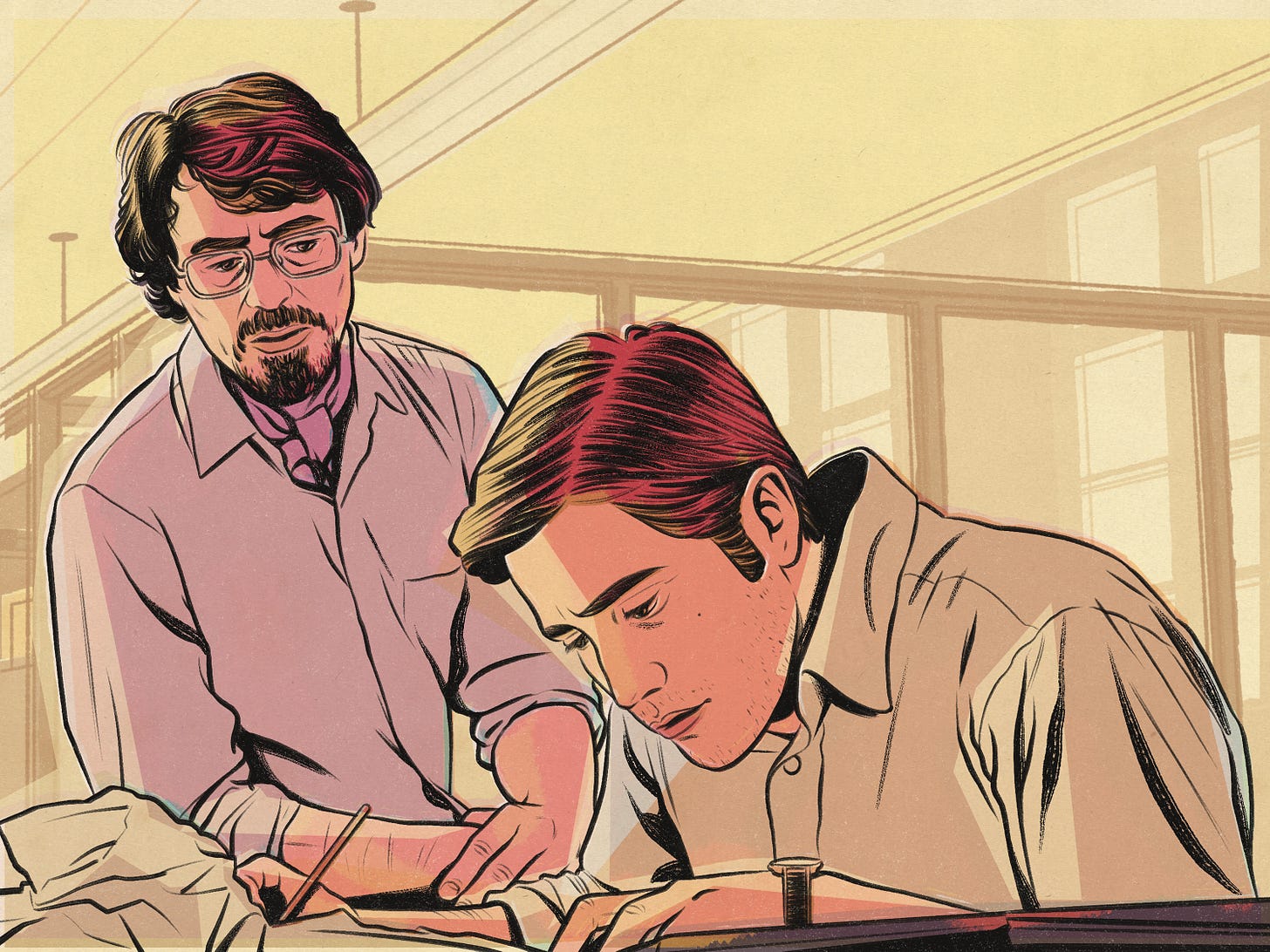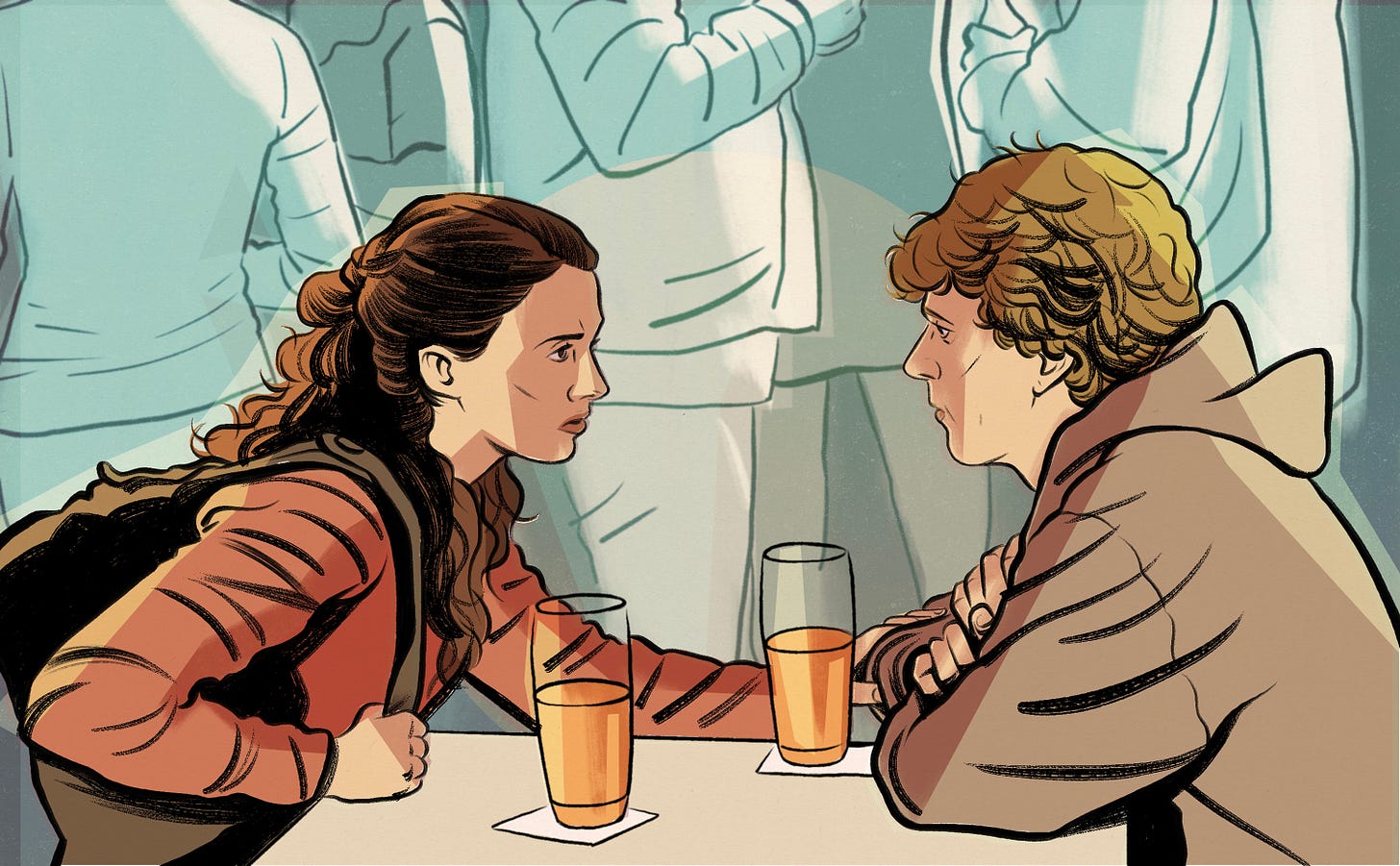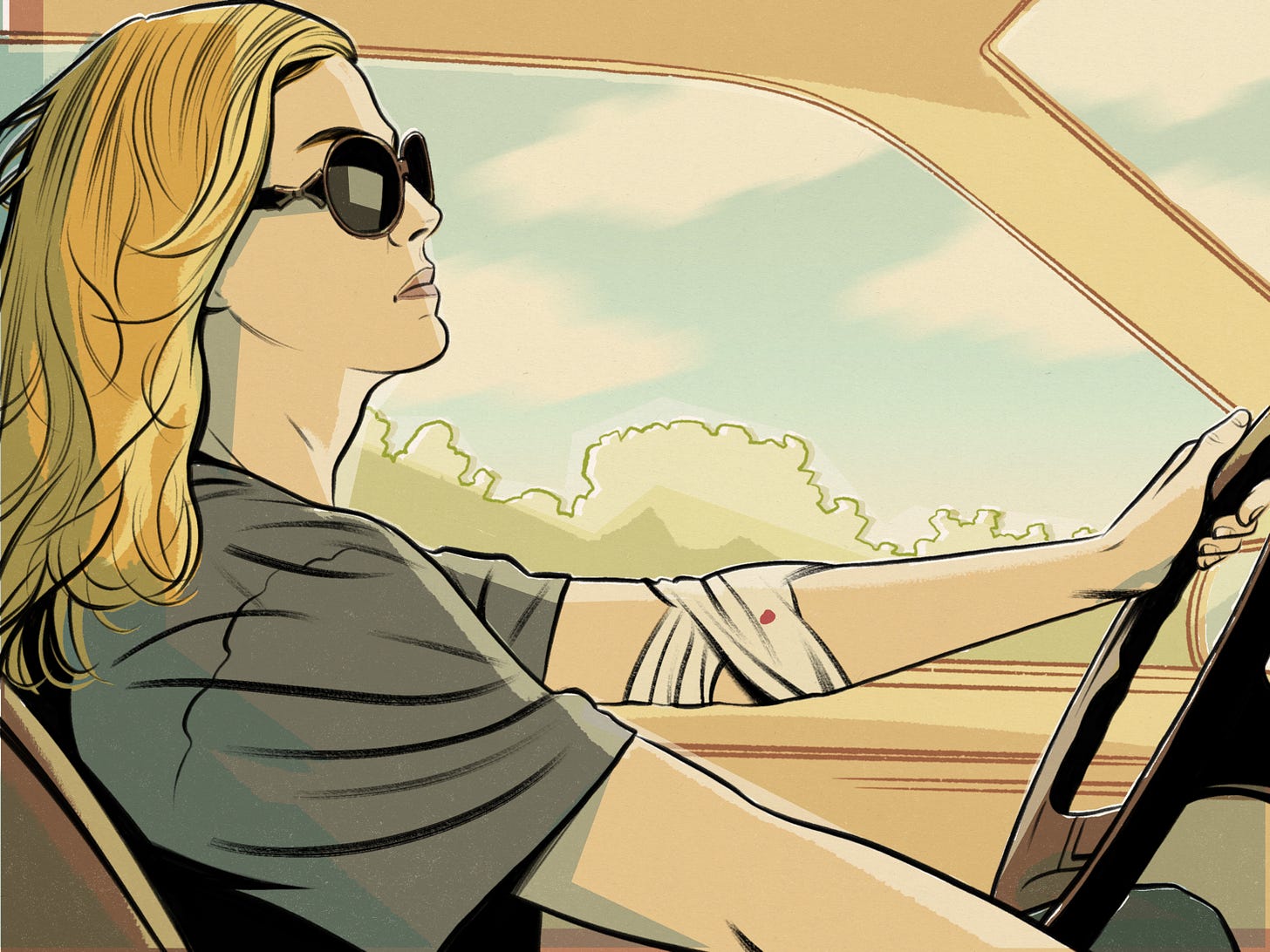This Time I'll Get It Right
On Perfection, Precision, and the Politics of David Fincher
“My process is purely logistical, narrowly focused by design. I'm not here to take sides. It's not my place to formulate any opinion. No one who can afford me, needs to waste time winning me to some cause.” - The Killer
In a Letterboxd review, I used this quote from The Killer to make the same observation that a million other people have made about the film: namely, that it’s a knowing, tongue-in-cheek, self-portrait of its director - David Fincher. You can see why everyone came to the same conclusion. The film is about an obsessive, exacting professional who is determined, to a fault, to get the perfect shot.
“The fact is, you don't know what directing is until the sun is setting and you've got to get five shots and you're only going to get two.” - David Fincher
Fincher, when asked about this, can see the thinking behind it, but considers us all “weak-minded” for making the comparison. Fincher reliably gives good quote.
I love Letterboxd, but I’m not very good at it. There’s a very specific pithy but incisive review (not unlike the early days of crafting a perfect tweet) that works well on the platform and I’m probably a little too earnest to really nail it. That said, I think my use of the quote above was still too shitposty and unfair to Fincher. It suggests he’s apolitical, amoral, and a nihilist. Looking at his body of work, he’s clearly not - but it’s easy to fall into the trap of assuming he is. I think I’ve spent most of his career believing his worldview could be summarised by Somerset’s bleak final lines at the end of Seven:
“Ernest Hemingway once wrote, "The world is a fine place and worth fighting for." I agree with the second part.” - William Somerset
While I think his interest in plumbing the depths of human depravity across his filmography suggests Fincher’s sympathetic to that kind of nihilistic weariness, I always forget the idealism of that line. Somerset will continue to fight. He isn’t a doomer itching for an excuse to give in. He may not believe the world is a fine place, but he’ll keep trying to change that.
Because Fincher’s films look as good as they do, and his preference for a non-judgmental, omniscient camera that seemingly (and sometimes impossibly) just follows the action, there’s a temptation (of which I’ve not been immune) to assume he’s glorifying a particular act of violence or worldview in his films.
No film is a better example of this than Fight Club. A film that has been embraced by red pill enthusiasts and manosphere wazzocks in the same way that fellow 1999 alum The Matrix has. Both films recognised and drew attention to the alienation, dissatisfaction and powerlessness people felt (and feel) in the heart of neo-liberal late stage capitalism. What seems to be mostly forgotten about the second half of Fight Club though, is that it’s largely a warning about charismatic, opportunistic leaders who promise to fix it. That still feels like an appropriate message for today. One that the very same red pillers would do well to heed. That said, it’s far from a perfect film and I like that even Fincher recognises that someone being a fan of it can be a massive red flag:
“My daughter had a friend named Max. She told me Fight Club is his favourite movie. I told her never to talk to Max again.” - David Fincher
Excellent soundbite. No notes. Here’s another about his masterpiece - Zodiac:
"I want to make a movie that has enough impact that it's going to do what it needs to do. But I don't want to make a film that serial killers masturbate to." - David Fincher
I’ve been thinking a lot about Fincher’s work recently due to digging into the David Fincher mini-season of Blank Cheque. I’d recommend giving it a listen. The more I’ve been revisiting his work and listening to the podcast, the more I’m learning to Stop Worrying and embrace my love of Fincher.
A lot of people consider Fight Club to be the last film of the 90s, or the first film of the 21st Century. I think both are true. The film captured a growing anti neo-liberal feeling that No Logo (which was published the same year Fight Club was released) also tapped into.
“Anybody looking outside themselves to make themselves whole is delusional and probably sick.” - David Fincher on his ambivalence towards his advertising work
The Social Network, similarly, seemed to be the first film to truly have a handle on how social media was changing the way we interacted with ourselves and each other. It understood socialising was evolving into a transactional form that only really makes sense to a handful of deeply anti-social tech billionaires.
“I don’t do the Facebook, and I never did. I’m not saying that I didn’t go to high school with really fascinating people, I’ve just never particularly wanted to check in with them. I waste my time with other shit that’s probably just as infinitely stupid.” - David Fincher
The Killer, in retrospect, feels like the third entry in an unofficial trilogy of Fincher documenting and reflecting the opening quarter of this Century. It is the ultimate gig economy film. As a freelancer, I too have had clients who seem unconcerned with the humanity and well-being of the person they hired. It’s also a film that highlights how easy it is, with the impersonal nature of Amazon deliveries, self-checkout and WeWork spaces, for psychopathic assassins to blend in and disappear. We are constructing bubbles of isolation for ourselves, the film seems to argue, and only the worst people will thrive in it.
For all the talk of 100 takes, and the unending, myopic quest for cinematic perfection, I think this side of Fincher’s work is less discussed. Considering how meticulously planned his films are, he’s incredibly canny at choosing projects that lock onto a socio-political zeitgeist before anyone else.
“Entertainment has to come hand in hand with a little bit of medicine.” - David Fincher
That his films, no matter how dark the subject matter, are so buttery smooth and satisfying to watch (I challenge you to discover a Fincher film is on TV and not find yourself watching it to the end) can work against him I think. He has no pretensions. He continues to work in genre movies despite making it into the Oscar contender part of his career. He happily laughs in the face of the auteur theory (going so far as to make a film about the importance of screenwriters)… All of which can add up to a consensus of people enjoying his films when they come out and only really taking them seriously in retrospect.
“Part of my testiness is that I feel I make fifty compromises a day. When people come to me to say 'Why can't you compromise?' I'm like: 'What are you talking about? The fact that we're having this conversation means that we've compromised'.” - David Fincher
When it comes to drawing, I think of myself as a perfectionist. But not in the way Fincher works. Where Fincher seems allergic to the phrase “good enough”, I don’t believe I have the stamina or patience for consistently resetting and starting again. My brain just isn’t wired that way. I will adjust my ambition for a project based on the deadline and budget. I want a life outside of my work. The stories I hear about Fincher’s uncompromising nature just make me feel extremely lazy.
My problem, instead, is more about reigning in my very organised, finickity, tidy instincts. Left unchecked, I can overly obsess on an image, zoomed in at 500%, tidying parts people won’t even pick up on. Sometimes that attention to detail can be a useful way of working on illustrations, but it can be the death of a well-paced, flowing comic. Even with illustration, it can flatten the art and make it feel static and lifeless if you’re not careful.
Working digitally makes this worse of course. You can undo and redo lines forever, and obsess over details that will be lost when printed. A lot of this is just busy work that feels productive, but can make the art look fussy. I need to constantly remind myself that spending that energy trying to reduce the number of lines is a much better use of my time.
Every digital artist implements various rules/practices (only working at 300dpi, never zooming in beyond 100% etc.) and finding brushes and techniques in an attempt to keep the work from feeling coldly digital.
“I don't think that digital technology will ever take away the humanity of storytelling, because storytelling is entirely, in and of itself, a wholly human concern.” - David Fincher
On this, Fincher is a good director to look at. He was one of the few directors who adopted and embraced digital filmmaking early on, but he worked with talented cinematographers who managed to achieve a look that had the same tactile warmth as something filmed on celluloid. Something most of his imitators fail at.
Feeling in a bit of an artistic rut, I’ve been trying to push myself out of my fussiness, or at least find a way to incorporate messy contrasts. This has been one of the reasons I’ve been drawn to risograph printing. Risoprint naysayers like to scoff at the popularity of the printing technique in zine/comic circles by pointing out that it’s a cheap colour photocopier. But that’s exactly what I’m looking for. The misregistration and toner inconsistency is what brings life to my art. It’s the mistakes and faults I’m looking for with riso. It contrasts well with my controlled lineart.
But I’ve been trying to incorporate more contrast into my non-printed art recently. Looking back at an old Greg Smallwood process thread that has stayed with me. If you’re an artist reading this (and even if you’re not), I’d really recommend giving it a read. In the thread, Smallwood discusses how he creates contrast in his work by taking inspiration from mid Century illustration and the beautiful background art of 101 Dalmatians. I’d also recommend this thread in which he talks about the influence of artists like Ángel Badia Camps, Maurice Noble, Irv Wyner and Austin Briggs.
For the illustrations I’ve made to accompany this newsletter, I’ve tried to internalise a lot of this and be a bit more playful and experimental with the way I approach digital colouring. It’s still early days, but I’m already feeling encouraged by the results. The scrappier, looser quality to the colours plays well with my more tightly controlled lineart. More to the point - I’m having fun with them, and excited to play around more and see where this takes me. I expect it will find a way into my comics work too.
I tricked you. This began as an essay about David Fincher but it was actually a deep dive into… Process!
To make up for it, here’s another quote from Fincher about making movies which is also how I think about making anything:
"You can’t take everything on. That’s why when people ask how does this film fit into my oeuvre. I say 'I don’t know. I don’t think in those terms’. If I did, I might become incapacitated by fear… How do you eat a whale? One bite at a time. How do you shoot a 150-day movie? You shoot it one day at a time." - David Fincher
Links
My Grave Offerings about Panic Room has lots of links to Fincher video essays if you’re wanting to go down the same rabbit hole I did.
The video essay I keep coming back to is this one about how Fincher hijacks your eyes.
You can listen to the Blank Cheque mini-series on Fincher here.
There’s a great collection of all of Greg Smallwood’s threads here, including an excellent must-read about the myth of artists not using reference.
If you’re thinking of re/watching some Fincher, I have some double-bill pairings in mind! Because I. Am. Fun!
Between The Lines (Dir. Joan Micklin Silver, 1977)
Zodiac (Dir. David Fincher, 2007)Sneakers (Dir. Phil Alden Robinson, 1992)
The Social Network (Dir. David Fincher, 2010)Possession (Dir. Andrzej Żuławski, 1981)
Gone Girl (Dir. David Fincher, 2014)Fight Club (Dir. David Fincher, 1999)
How to Blow Up a Pipeline (Dir. Daniel Goldhaber, 2022)






Great stealth process post Tom! Really enjoyed your thoughts on both Fincher and your own work. Illuminating!